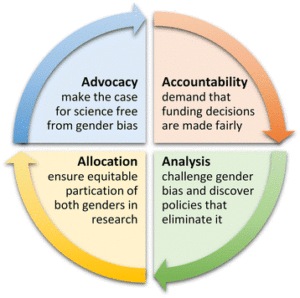
Whereas the public, governments, industry, and research institutes around the world expect increased returns on investment in health research, a significant proportion of this investment may be wasted if it is not equitably distributed by gender.
Currently, women tend to be underrepresented in research as both researchers and participants, receive less research funding, appear less frequently than men as authors on research publications, and win fewer prestigious scientific awards and prizes. For example, among 210 Nobel Laureates in Physiology or Medicine awarded from 1901 to 2015, there are only 12 (5.7%) women.
Moreover, there is evidence that both biological sex differences and sociocultural gender differences are not routinely included in research design, which may lead to women being relatively disadvantaged as the beneficiaries of research, in terms of its health, societal and economic impacts.

At the same time, a project and case studies on “Gendered Innovations in Science, Health & Medicine, Engineering and Environment” have recently demonstrated that including sex and gender analysis in research design can increase innovation and lead to new important discoveries.
Given that research enterprise in many parts of the world is extremely decentralized and even fragmented, policy action to maximize research impact through the gender equity pathway needs to be led by research funders, research institutions, and research evaluators from the bottom up.
As many research funders and institutions seek to become globally competitive in the knowledge economy, research enterprise also becomes increasingly globalized. Therefore, to be maximally effective, action to promote gender equity in research needs to be taken from the bottom up at a global level.
My colleagues from 15 countries, spanning all five continents, and I are proposing to maximize research impact by focusing on the four ‘As’ of research impact assessment with regard to gender equity: Advocacy, Accountability, Analysis and Allocation (Figure 1).
In our article we offer detailed recommendations for major stakeholders on how to include and strengthen analysis of gender equity in research impact assessment (Table below). We conclude by calling on research funders, research institutions, and research evaluators globally to include gender in research impact assessment in order to maximize scientific, societal and economic returns on investment in research.
Table 1 Recommendations to include and strengthen analysis of gender equity in research impact assessment
| Stakeholders | Recommendations |
| Research funders | • Conduct retrospective and prospective observational gender-based research impact assessment to inform implementation of gender equity policies
• Adopt policies to ensure that researchers address relevant sex and gender issues in their research designs and analyses • Identify and apply evidence-based approaches to integrating gender equity into research funding criteria • Where appropriate, support theoretical and applied research on the scientific, societal and economic impact of gender equity in research |
| Research institutions | • Establish information systems for collecting and analysing gender-based information on the research process
• Work towards improving and refining the quality of gender-based data • Train and support interested students and staff to include gender in research impact assessment • Establish gender equity activity as a criterion for performance management and annual appraisal and promotion |
| Research evaluators | • Engage with the research impact assessment literature with a view to identifying and applying evidence-based tools and approaches to gender-sensitive research impact assessment
• Identify, investigate and address gender differences in research production and impact, including commercialisation • Increase the objectivity of research impact assessment by conducting evaluations in gender-balanced teams using an appropriate mix of methods • Collaborate and share knowledge through gender-balanced networks and communities of practice • Engage impact assessment users and the public in debate on gender bias and recommend actions for change |
Comments